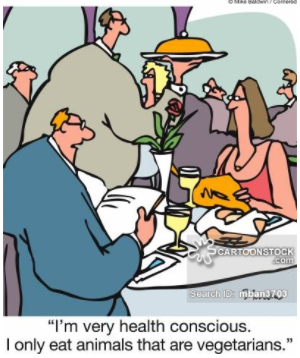
By YUCHEN FAN
AP Lang Student
The concept of veganism is simple: to contribute to the suffering of animals as little as possible. Yet when people hear the word “vegan” or “vegetarian,” they tend to imagine an angry hippie sitting in trees, spouting the evils of consumerism. And while that stereotype is not unfounded, the majority of people who are vegan or vegetarian are not hippies and simply choose this lifestyle for environmental reasons, to save the planet and for moral reasons: to save farm animals tremendous suffering.
The fact is, numerous studies have shown animal agriculture to be the number one contributor to global warming, as well as many other environmental issues. This is because “all of our cattle feedlots produce methane and carbon dioxide, in addition to [that released by] the manure lagoons [outdoor basins used in factory farming filled with animal waste],” as Jennifer Bartlau (Science Dept.) said. These facts are especially concerning because methane, which comprises much of greenhouse gas emissions produced by the livestock industry, is thirty-five times more potent than carbon dioxide. Furthermore, the fact that only ten percent of energy is conserved as you move up the food chain (the remaining ninety percent is released as heat) ensures that 100 calories from a cow that has eaten grain will require significantly more water and energy than 100 calories of the grain, as Ms. Bartlau detailed. And, in a world where ninety-seven percent of the world’s soybean crop and a significant percentage of other grains are fed to livestock, but where 720 million people go hungry, wasting so much land and resources on animal agriculture does not make sense.
Moreover, factory farming has exploited farm animals in unspeakable ways just to meet a quota or to obtain a certain profit for large corporations. As kids, we may have imagined farms to be filled with cows lazily grazing on acres of grass and pigs happily wading in pools of fresh mud. This could not be further from the truth. Not only have the small scale family farms we envisioned in our youth been replaced by large factory farms, which dominate over ninety-nine percent of the market, but these animals are also forced to live in small, cramped cages their entire lives, often dying without having seen the sun. The devastating cruelty of slaughterhouses is undeniable,. There are countless stories about bulls being skinned alive or babies being cut out of bellies of slaughtered pregnant cows, as former slaughterhouse worker Josh Agland told the Huffington Post. In addition, factory farming has guaranteed that farm animals today not only endure incredible suffering in their deaths, but also face constant fear and torment throughout their entire lives. Chickens have their beaks and claws cut off so that they can spend their lives in filthy cages, where it is so cramped that outbreaks of disease are recurrent and spread like wildfire. Cows raised for beef are also forced into cramped sheds, where they are pumped with antibiotics and other drugs to help them grow faster and prevent the inevitable diseases bred by these living conditions.
However, some may say that we, as humans, are more intelligent than other animals and therefore have the right to use and consume them as we please. The concept of a judged higher level of intelligence has been used to justify incredible atrocities throughout history, from the cruelty of slave-owners to the devastation of the Holocaust. The argument that humans can exploit animals because of our higher intelligence has the same flaws. In addition, while it may be true that humans have higher intelligence, animals can feel the same emotions of happiness, sadness, love and pain, just as we can. Thus, even though we may be in a world of seven billion other people, I have no doubt that, by going vegan or going vegetarian or consuming less meat, we can reduce the unspeakable horrors that farm animals must face and increase awareness for their condition. After all, as John F. Kennedy famously said, “Everyone can make a difference, and everyone can try.”













